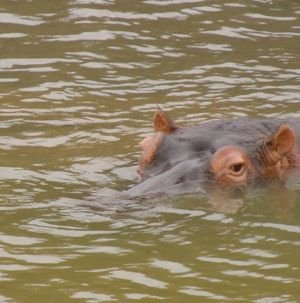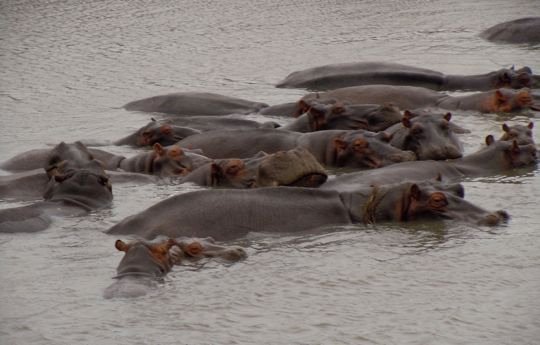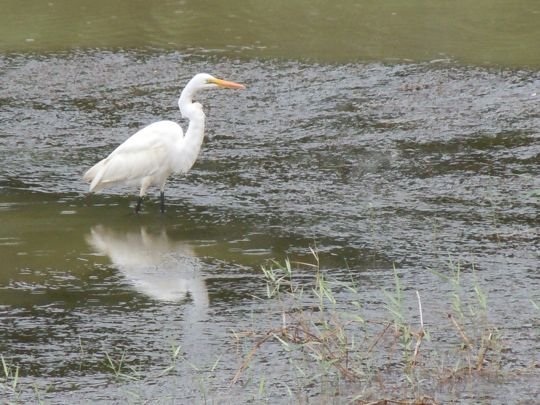Our river expedition in the St. Lucia Estuary this morning was mainly about hippos. These cuddly looking fellows kill more people in Africa than does any other animal. How? They can run 45 kilometers an hour, they can weigh two tons, and they have big teeth. Their cute looks apparently lure too many into taking dumb chances.
As we approached our first hippo pod, four kayakers were also in the vicinity. Our guide, Stephen Hart of St. Lucia Safaris, noted that two of the hippos launched out after them, whereas  the pod had not seemed to mind the presence of our much larger craft, with two outboard motors. “It’s a bit of a stare-down,” Stephen observed as we watched the hippos and the kayakers, who wisely blinked and paddled away. Hippos have poor eyesight but excellent hearing, so the engine’s noise let them know exactly where our boat was. Not so with the kayaks, which therefore may have seemed to be more of a threat to the pod.
the pod had not seemed to mind the presence of our much larger craft, with two outboard motors. “It’s a bit of a stare-down,” Stephen observed as we watched the hippos and the kayakers, who wisely blinked and paddled away. Hippos have poor eyesight but excellent hearing, so the engine’s noise let them know exactly where our boat was. Not so with the kayaks, which therefore may have seemed to be more of a threat to the pod.
We found most of the hippos snuggled together, one huge head resting on a neighbor’s butt, like puppies in a litter. When we came across a solitary female, Stephen said she was about to give birth. “As everybody knows, a female in that condition has a bit of a short fuse and no sense of humor, so we’re not going to bother her,” he quipped as we moved briskly by. The baby hippo will weigh 20 kilograms. If it’s a girl, mother and child will return to the pod fairly soon. If it’s a boy, they will stay away for much longer, to give the male time to get big enough to avoid being killed by the other males in the pod.
We heard from Stephen and from a waitress at a restaurant last night in St. Lucia that the hippos prefer the water during the day, but at night they sometimes take strolls to town in order to munch on the contents of local gardens. This is a truly amazing image, almost worth staying up late to see, but we were tired and went to bed.
In the estuary on the boat, we also saw Goliath Heron, a crocodile skimming slowly across the surface of the water like a floating dagger, an African fish eagle who mates for life, and a great white heron, standing with his reflection.


